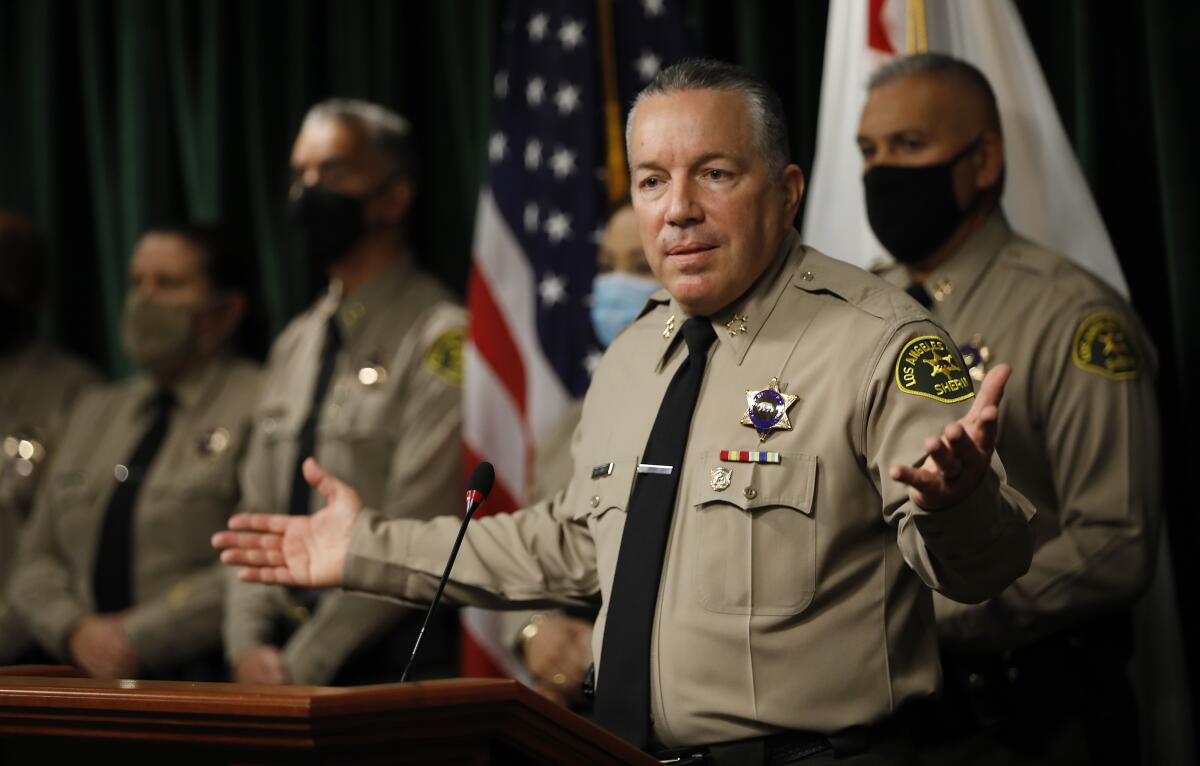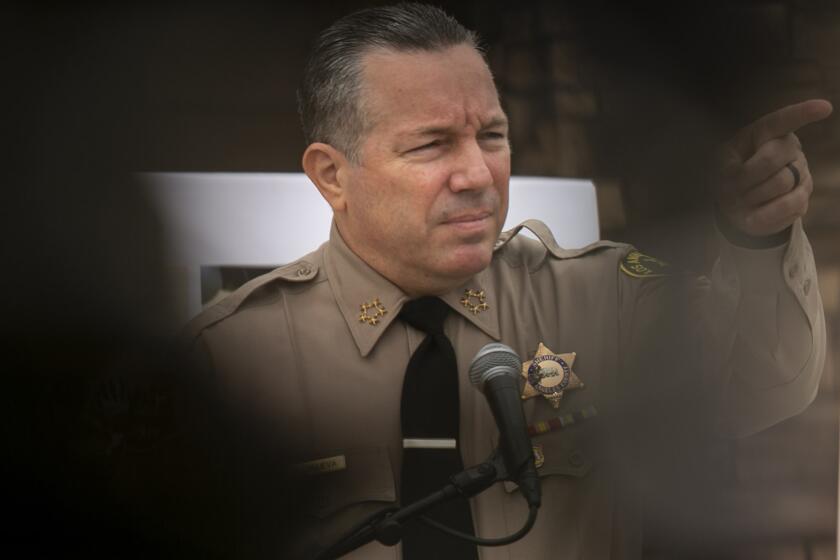L.A. County sheriff has legal power to ban gang-like groups of deputies, county lawyers say

- Share via
Los Angeles County Sheriff Alex Villanueva has broad legal authority to crack down on entrenched, gang-like groups of deputies that have been accused of glorifying violence and whose members have cost taxpayers tens of millions of dollars in legal payouts, according to attorneys for the county.
The confidential legal opinion issued last month by the Office of County Counsel knocks down claims by Villanueva that he is limited in what he can do to combat the problem and that an attempt to prohibit deputies from joining the groups would violate their constitutional rights. A copy of the memo was obtained by The Times.
In a new opinion, county attorneys advised the Sheriff Civilian Oversight Commission that the Sheriff has broad authority to crack down legally on the gang-like groups of deputies.
“The County’s compelling interest in restoring or increasing public trust in the LASD and preventing the harm subgroups cause to the County, LASD, and community members justifies a policy that bans participation in subgroups,” county attorneys wrote in the memo to the Sheriff Civilian Oversight Commission, an independent watchdog group.
The lawyers’ clear-cut stance comes amid heightened scrutiny of the groups, which have plagued the department for decades, as elected officials and community groups increasingly have pressured Villanueva to deal with them decisively. State legislators have passed a bill that would ban “law enforcement gangs” in all law enforcement agencies, while county officials have clashed with the sheriff over what they say are his insufficient efforts.
Since taking office at the end of 2018, Villanueva has said that trying to determine which of the department’s 10,000 deputies belong to one of the many groups would amount to “an inquisition.”
“That would be inappropriate and wildly speculative,” the sheriff said last year. “We’re trying to run an organization, not engage in a witch hunt.”
The FBI is investigating a secret society of tattooed deputies in East Los Angeles as well as similar gang-like groups elsewhere within the Los Angeles County Sheriff’s Department, multiple people familiar with the inquiry said.
To justify his stance, Villanueva has referred to legal direction the County Counsel Office gave sheriff’s officials in 2014, saying lawyers concluded that banning the graphic, matching tattoos that group members often got or forbidding deputies from associating with a particular organization would violate their free speech rights.
A copy of the 2014 legal opinion obtained by The Times showed it was less expansive than Villanueva’s portrayal and narrowly addressed just one issue: whether a proposed policy banning certain kinds of tattoos would pass constitutional muster.
To justify not taking a more aggressive stance on banning gang-like groups of deputies, Villanueva has relied on this legal opinion that attorneys for the county wrote in 2014.
Attorneys at the time determined such a policy was unlikely to hold up under a legal challenge because tattoos are considered a form of free speech, and inspecting deputies’ bodies for tattoos would violate their rights as well. Lawyers recommended instead that the department simply direct employees to cover their tattoos while on duty. Department policy requires deputies to cover their tattoos, though it’s unclear when that rule went into effect.
In the recent memo, county lawyers advised the commission that the sheriff had the legal authority to put an end to the gang-like clubs.
Rep. Maxine Waters asks U.S. Justice Department to investigate allegations a violent gang of deputies runs the L.A. County sheriff’s Compton station.
“Because a ban on subgroups is connected to employees’ conduct in their capacity as LASD personnel, not as private citizens, it likely does not implicate the First Amendment,” the memo said. “Subgroups do not exist separate and apart from LASD employment. They are defined based on LASD stations, bureaus, or units, and their activities are intertwined with law enforcement functions.”
The legal opinion was written in response to a request from the commission in May for county attorneys to weigh in on its proposal that the Sheriff’s Department fully ban employees from participating in, joining or soliciting others to join the illicit groups. The commission’s authority over the Sheriff’s Department is limited, and Villanueva is not required to adopt its recommendations.
Villanueva did not respond to questions from The Times. A Sheriff’s Department spokesman did on his behalf, saying the agency disagrees with the new legal opinion and believes the far-reaching policy proposed by the commission would be unconstitutional.
Capt. John Satterfield said the county lawyers’ recent opinion was broad and did not address questions about “policy language, enforcement, discovery, search, photographs, discipline, investigation, invasion of privacy, clothing removal for visual inspection.”
Lawyers for L.A. County Sheriff Alex Villanueva argued in a court filing that the request for testimony is “too broad” and “harassing.”
He added: “Recently county counsel opinions have lost credibility, as they have been caught contorting to support politically motivated actions by the Board of Supervisors and their appointees, rather than informing elected officials with honest interpretations of statutory and case law.”
In the past, Villanueva has denied that “gangs” exist within the department and has downplayed the issue, saying problems associated with the groups are instead often the result of drunken deputies getting into fights.
“If you look at the majority of them, that is what it has been,” he told the Civilian Oversight Commission last year. “All these things are people getting into fights, and it is actually internal, not external to the community.”
But the sheriff has also taken credit for addressing the problem with a policy that prohibits deputies from joining groups that promote behavior that violates the rights of others. And in May Villanueva said he had broken up the Banditos, a group of deputies assigned to the department’s East L.A. station, with disciplinary actions and by reassigning alleged members to other stations — a claim some sheriff’s officials and others dispute.
Villanueva has said he supports legislation brought by Assemblyman Mike Gipson (D-Carson) that would require police agencies to have a policy prohibiting officers from participating in “a law enforcement gang,” which the bill defines as a group of officers who engage in a pattern of rogue behavior on duty that “violates the law or fundamental principles of professional policing.” Violating these policies would be grounds for termination under the proposed law.
The allegations revive concerns of inked deputy groups — with monikers such as the Spartans, Regulators and Banditos — operating out of several L.A. County Sheriff’s Department stations
The Legislature earlier this month overwhelmingly approved the bill, and it is now on the governor’s desk. If the bill is signed into law, it’s unclear whether the Sheriff’s Department would be required to write a new, stricter policy than the one already on the books.
Satterfield said the Sheriff’s Department was “confident in our current policy, and that it meets the requirements of AB 958 if it becomes law.”
“We have a policy on deputy cliques, and it is working,” he said. “Like all organizational change, it takes time to see the results.”
Critics of Villanueva’s policy have said it doesn’t go far enough to be effective.
L.A. County has paid out at least $55 million in settlements in cases in which sheriff’s deputies have been alleged to belong to a secret society. Several other cases are pending, including one brought by eight deputies who alleged they were routinely harassed by the Banditos.
The deputies alleged the Banditos refused to send back-up on dangerous calls, knocked two deputies unconscious at a department party at an event space called Kennedy Hall, and once secretly removed ammunition from a deputy’s gun.
In another legal claim against the county last year, a deputy made similar allegations about the Executioners, a band of deputies with matching tattoos the deputy claimed wielded vast power at the Compton station. The claim said the group — sporting tattoos of a skull with Nazi imagery and an AK-47 — celebrated deputy shootings and the induction of new members with “inking parties.”
The authors of an independent study released last week also recommended bolstering the policy Villanueva implemented by defining more specifically what was prohibited and by requiring deputies to disclose their membership in organizations. The study, which L.A. County officials commissioned the Rand Corp. to conduct in 2019, found that the groups were probably growing.
“Our research suggests that several of these groups were still actively adding members at the time of our interviews,” the report said. The interviews were conducted between November 2019 and September 2020.
A report by the Center for Juvenile Law and Policy at Loyola Law School found that since the 1970s there have been 18 deputy cliques within the Sheriff’s Department, some of which remain active. More recently, the agency has been roiled by allegations that groups of deputies with matching tattoos have run roughshod over the East L.A. and Compton sheriff’s stations.
More to Read
Sign up for Essential California
The most important California stories and recommendations in your inbox every morning.
You may occasionally receive promotional content from the Los Angeles Times.













